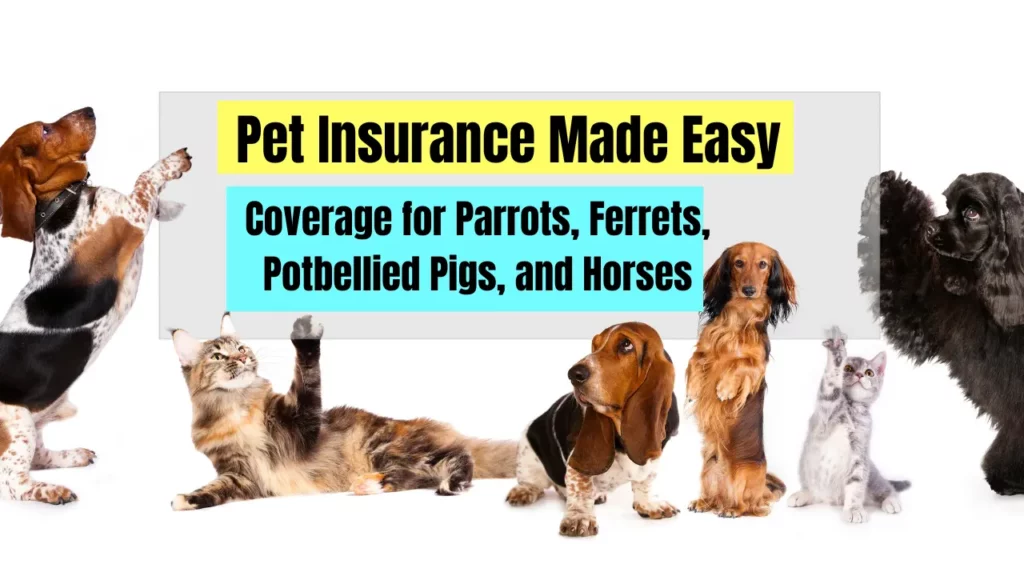Insurance is still offered even if your pet isn’t a dog or cat.
Pet insurance is typically purchased for a dog or cat. It should come as no surprise that approximately 85 million American homes, or 67% of all households, own a pet. In terms of specifics, 63.4 million of them own a dog, 42.7 million a cat, and 28.7 million a bird, fish, or other small animal. Just 1.6 million people own horses as pets.
Finding information regarding health or accident insurance for Fido or Fluffy is not too difficult, but what about your Vietnamese potbellied pig, Einstein? Unbelievably, there is pet health insurance available for pets “other than dogs and cats.” All you need to do is know where to look.
Table of Contents
ToggleKEY TAKEAWAYS of Pet Insurance
- There is limited yet available pet health insurance for pets “other than dogs and cats.”
- Pets that are not dogs or cats fall into three primary categories: avians (birds), exotics, and equines (horses).
- The only insurer of birds and exotics in the United States is Nationwide.
- Nationwide and several other firms offer insurance for horses.
- Medical credit cards and discount membership programs are insurance options.
Highlight Table
Advertisement
| Category | Information |
| Insure Your Ferret or Parrot Easily | Insurance is available for pets other than dogs and cats, including birds, exotics, and horses. |
| Key Takeaways | – Limited yet available pet health insurance for pets other than dogs and cats. – Avians, exotics, and equines (horses) fall into distinct categories for insurance purposes. |
| Avians, Exotics, and Equines | – Nationwide is the sole insurer of birds and exotics in the US. – Nationwide and other firms offer insurance for horses. – Alternatives include medical credit cards and discount membership programs. |
| Excluded Species and Breeds | – Nationwide excludes certain birds and exotic animals. – No breed of horse is technically excluded from equine insurance. – Membership discount plans or medical credit cards have no species exclusions. |
| Veterinary Care Costs | – Costs vary depending on the type of pet and the care required. – Avians and exotic animals may require specific care raising expenses. – Costs for birds, small mammals, reptiles, and amphibians are comparable to those for dogs and cats. |
| Terms and Conditions | – Nationwide offers exotic pet insurance on a reimbursement basis. – Covered treatments reimburse 90% of the approved sum after deductibles and co-pays. – Exclusions include preexisting conditions and certain circumstances. |
| What’s Included | – Medical care and surgery for illnesses and injuries are covered. – Exams, lab costs, medication, X-rays, and hospital stays are included. |
| What Is Not Included | – Preexisting conditions, waiting time situations, hereditary and congenital disorders, and breeding-related circumstances are not covered. – Grooming fees, boarding or transportation charges, and certain dental procedures are excluded. |
| The Cost of Coverage | – Species and size-specific premiums apply. – Premiums vary annually and may change with relocation. – Average monthly premiums range from $8 to $15.75 for different types of pets. |
| Equine Insurance | – Equine insurance differs from avian and exotic insurance due to the size and complexity of care. – Types of coverage include mortality, medical, colic, surgery, liability, and infertility. – Premiums depend on factors like age, breed, usage, and value of the horse. |
| Alternatives for Pet Insurance | – Veterinary discount membership plans offer discounts on medical services. – Medical credit cards provide financing for veterinary bills. – Both options have considerations and limitations. |
Advertisement
Avians, Exotics, and Equines
Any pet that isn’t a dog, cat, or large farm animal (think horses and cows) is considered an exotic or an avian (bird) for insurance purposes. Equines are insured on a different policy and are not included in this list.
Nationwide, the only insurer of exotic pets and birds in the United States, covers the majority of tiny mammals, reptiles, amphibians, and birds. Insurance for horses is provided by Nationwide and a few other firms. Comparison shopping is not an option because Nationwide is the only insurance provider for exotic pets and avians. However, there are alternate forms of coverage to Nationwide’s exotic pet insurance, such as membership-based veterinarian discount programs and medical credit cards.
Excluded Species and Breeds
Nationwide does not insure certain birds and exotic animals. They comprise all species found in the aforementioned groupings:
Technically, no breed of horse is excluded from equine insurance. Other factors such as age and health profile, however, may exclude the animal or make insurance cost prohibitive.
When it comes to alternatives to insurance such as membership discount plans or medical credit cards, there are no species exclusions, including for avians or exotics. As these are not insurance policies but rather discount programs or credit accounts, underwriting doesn’t come into play.
Veterinary Care Costs
Certain avians and exotic animals require more specific care than dogs and cats do, necessitating more training and research on the side of the veterinarian. The length of the pet’s life and this could raise the expense of care. For others, the expense of care is about the same as it is for cats and dogs.
For instance, Nationwide reports that the most common medical condition affecting birds is feather picking and loss, with an average cost of $305. For small mammals, dehydration or constipation rank among the most common issues that need medical attention. On average, such treatment costs $483. Internal parasite treatment, which costs roughly $72, is the most common procedure for reptiles and amphibians. These numbers show that the cost of care is comparable when compared to those for dogs ($426 average annual cost of surgical operations) and cats ($214).
States may differ in their terms and conditions. Reaching out to the company will provide you with the most up-to-date information.
Terms and Conditions
Nationwide offers exotic pet insurance on a reimbursement basis, which means you pay up front and get your money back, generally in a week or two. After any deductibles or co-pays up to annual or per-incident amounts, covered treatments and procedures repay 90% of the approved sum.
For its exotics coverage, Nationwide charges a $50 deductible for unrelated incidents and a 10% co-pay (90% reimbursement), with a maximum of $2,000 per incident. There is no lifetime cap and an annual payout cap of $7,000 per insured animal.
What’s Included
In general, medical care and surgery for illnesses and injuries are covered under Nationwide’s bird and exotic pet insurance. Exams, lab costs, medication, X-rays, and hospital stays for fractures, wounds, tumors, and bacterial infections are all included in this.
What Is Not Included
Preexisting conditions are not covered by Nationwide’s avian and exotics policy, as they are not by most pet insurance policies. Other exclusionary circumstances consist of:
- Situations that arise within the waiting time
- Hereditary and congenital disorders
- Not included in the benefit schedule conditions
- Breeding or breeding-related circumstances
- Grooming fees, boarding or transportation charges, vitamins, mineral supplements, and special meals
- Orthodontics, endodontics, tooth cleaning, polishing, and extraction of deciduous teeth
Diagnosis, treatment, or surgical correction of any endocrine tumors (benign or malignant), any type of endocrine hyperplasia, or related splenectomy for ferrets
The Cost of Coverage
Species and size-specific premiums are charged under Nationwide’s Avian and Exotic Insurance program. Every year when you renew your policy, it will go up, and it can also vary if you relocate to a different state. Nationwide reports that the average monthly premium for coverage of a bird or exotic pet is $15.75 for birds, $8 for reptiles, and $9 for the majority of other exotics.
Equine Insurance
As mentioned above, due to the size of the animal as well as the expense and complexity of care, equine (horse) insurance differs from avian and exotic insurance. Routine maintenance may only cost $400 to $600 a year, but colic surgery (which can be deadly for horses) might cost $5,000 to $10,000. Equine insurance is provided by Nationwide and a few other specialty insurers.
If your horse gets sick or dies, becomes unusable, or damages property or other things, including people, it can be insured against by equine insurance. The general topic of equine insurance includes a number of different types of horse insurance.
Your pet is protected by mortality (life) insurance from theft and natural causes of death. At the very least, most insurers demand that you get mortality insurance. You can add medical (sickness), colic, surgery, liability, and even infertility coverage to your mortality coverage. Usually, the horse’s entire worth is paid by death. There are deductibles and frequently co-pays for additional coverage.
The age, breed, usage, and value (the amount you bought or the assessed worth) of your horse determine how much death insurance will cost you. The horse’s value can be roughly estimated by multiplying it by 3%. For instance, yearly premiums for death insurance on a $25,000-worth horse would be $750. The cost would increase for additional coverage, such as medical, liability, and colic.
Alternatives for Pet Insurance
Veterinary membership discount programs and medical credit cards are the two main alternatives to traditional avian, exotic, or equine pet insurance. Neither of them is insurance, nor does it entail many of the other requirements that accompany insurance, such as underwriting or tests. However, before deciding to use one of these options, there are some crucial things to think about.
Veterinary Discount Membership Plans
Pet Assure and other veterinary discount membership plans offer a 25% reduction on all medical services rendered at a participating veterinarian’s clinic. Pet Assure states that there are “no exclusions based on age, breed, or type of pet, and every in-house medical service is discounted” with regard to covered breeds and species, and that only nonmedical care is excluded. Hereditary and preexisting conditions are also included.
Monthly dues are determined by the size of the animal. A ferret, for instance, would be categorized as a small animal and would cost $7 to $10 a month, depending on the zip code, if you paid monthly or annually. On the other hand, a potbellied pig would cost you $8 to $12 a month and be classified as a large animal, just like a horse, which is also covered.
Medical Credit Cards
Medical credit cards don’t have any monthly fees or discounts, like Care Credit or Wells Fargo Healthy Advantage. These are only credit cards intended for use with veterinary and other medical bills. Medical credit cards are only accepted by veterinarians who accept them; not all do. Discount programs are exclusive to participating veterinarians. If not, they can be applied to any veterinarian’s medical care costs. These cards often provide exclusive offers, such as a large charge that is interest-free for a certain number of months.

Consider Your Options
Whether to insure your rare or unusual pet is ultimately up to you. You have few options if you decide you want coverage. You can either choose to insure birds and exotics with Nationwide or go with one of the other options (medical credit card or discount plan).
You can choose from a number of insurance companies if your horse is your partner, or you can go with one of the other options available. Remember that equine health insurance can be far more costly than that of practically any other animal. Even with a deductible and copay, a 25% reduction is useful, but not nearly as helpful as reimbursement.
FAQ
A1. Avians (birds), exotics, and equines (horses) are typically covered under pet insurance policies apart from dogs and cats.
A2. Nationwide is the sole insurer of birds and exotic pets in the United States.
A3. Nationwide excludes certain birds and exotic animals from their coverage, but technically, no breed of horse is excluded from equine insurance.
A4. Veterinary care costs vary depending on the type of pet and the required care. However, avians and exotic animals may require more specific care, potentially raising expenses, while equine care can be more complex and costly due to the size of the animal.








